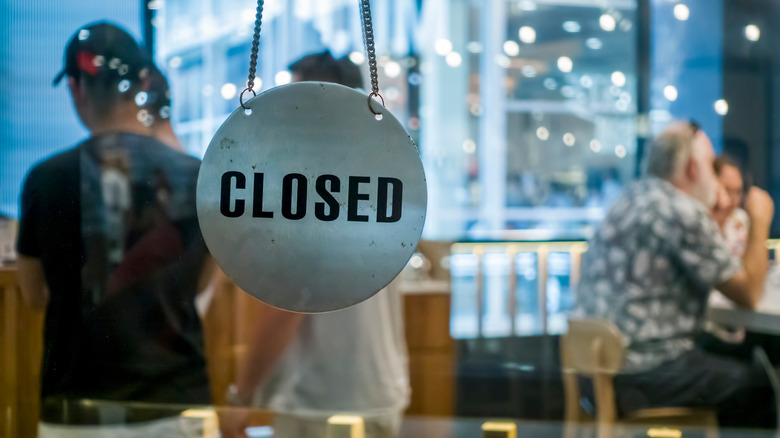Rent Is Increasing For Independent Restaurant Owners
If you've been struggling to make rent, you're not alone — the places that fuel foodies have been running out of fuel themselves. Data analytics firm Alignable just published its June Small Business Rent Report, and the findings aren't looking particularly optimistic for independent restaurant owners (for something different). Per the report, 63% of independent restaurant owners say their rent is higher in June 2023 than it was just six months prior in January. At the same time, small business owners also report that revenue has fallen by 50% or more compared to this time last year — and 62% of small businesses say they still haven't made it back to their pre-Covid sales figures.
The 63% figure is alarming enough on its own, but it becomes indicative of a rapidly-developing epidemic considering that 47% of small business owners said their rents were already too high in January. A reported 16% of those respondents say their current rent has increased by over 20%. Delinquent rents can mean backpay or late fees, which can make financial stressors even greater.
Rent insecurity has been an issue for at least an entire year now. In May 2022, 41% of small restaurant owners said they couldn't make rent, per a previous study by Alignable, and it seems to be getting more intense every month. 45% of all small restaurant owners across the board including non-food service ventures said they couldn't make rent in June, an increase from 44% in May.
Inflation and the labor shortage coming after restaurants' bottom lines
Roughly 33% of the business owners Alignable polled named inflation as their number one worry. Indeed, record-breaking inflation has recently been starting to cool but still has yet to go away. Prices for some items remain steep, and at this point, anyone who pays rent in any capacity may be beyond weary. Morale and optimism are at a low while inflation remains at a resilient high.
In January, Nation's Restaurant News reported that restaurant sales were also lousy, which is especially concerning considering Q4 is typically the best time of year for restaurants as folks celebrate the holiday season. This lack of traffic might indicate a tighter grip on discretionary spending as consumers struggle under the same economic weight as the businesses they're newly unable to patronize anymore.
Staffing issues have also been a hurdle for small restaurant owners against the backdrop of a nationwide labor shortage. In April 2021, the food service and accommodations sector quit rate hit an all-time high of 5.6%, forcing employers to increase wages and shorten operating hours by an average of 7.5%. It's great news for laborers (who are long overdue for a raise and have bills of their own to pay) but makes for an even further strain on the budgets of struggling mom-and-pop establishments nationwide.
Aid programs are ceasing and rent is going up
Consistently struggling to make rent has been a problem for independent restaurants for months now, and it yet remains unclear whether conditions will ease any time soon.
Back in May 2020 when the pandemic was still new, ragtag aid programs were set up to help empty restaurants which still had rent to pay despite mandatory dining room closures. At the time, landlords were hesitant to force tenants out for delinquent rent payments, as it was unsure when or if they'd be able to find a replacement at the same lease price. Now, however, as the pandemic has eased and restrictions have lifted, the rent crisis has created a tight market and competition is high. Independent restaurants no longer have the bargaining chip of market scarcity in their corner, and everyone is hungry for a space to call their own.
By June 2021, 39% of small restaurant owners couldn't make rent. Now, in July 2023 — a whopping three years since the start of the pandemic — that figure has increased to 63%, and businesses and consumers alike are feeling the heat. Realtor.com economist Danielle Hale told CNBC "My expectation is that rent growth will slow [in 2023], but we may not see it go back to what was typical before the pandemic." Aid programs have stopped, inflation is rampant, rent is increasing, and restaurateurs are being thrust into the battlefield empty-handed.


